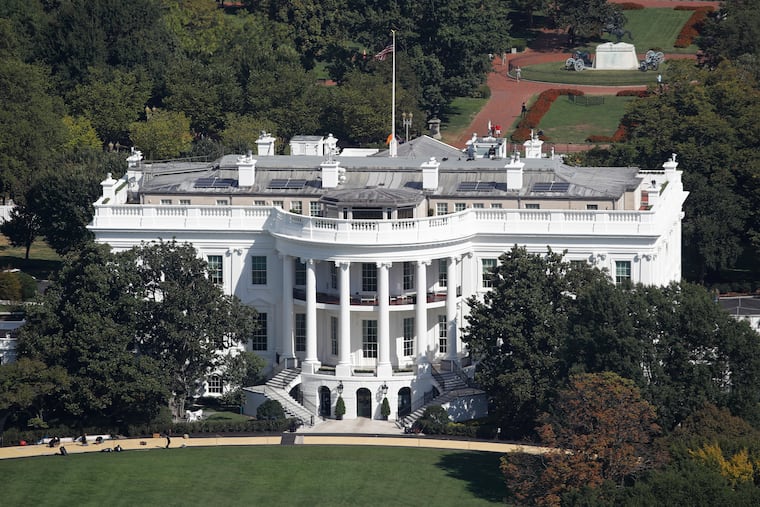Federal judge strikes down Trump asylum rule targeting Central Americans
A federal judge struck down a Trump administration policy that bars most Central Americans and other migrants from requesting asylum at the southern border, saying the government failed to justify making the sudden change last July without public notice or comment.

WASHINGTON — A federal judge in Washington struck down a Trump administration policy late Tuesday that bars most Central Americans and other migrants from requesting asylum at the southern border, saying the government failed to justify making the sudden change last July without public notice or comment.
The policy is aimed at blocking Central American migration by requiring asylum seekers from Honduras, El Salvador, Guatemala and elsewhere to first apply for asylum in countries they pass through on the way to the United States, particularly Mexico or Guatemala.
U.S. District Judge Timothy Kelly of Washington, D.C., a Trump appointee, held that the administration "unlawfully promulgated" the rule, failing to show it was in the public interest to stealthily implement the change and bypass the Administrative Procedure Act.
It is unclear what immediate effect the order will have. Citing the novel coronavirus pandemic, the Trump administration has sealed the U.S. immigration system so tightly that just two people seeking humanitarian protection at the southern border between March 21 and May 13 were been allowed to stay, The Washington Post has reported.
Still, the decision marked a defeat for the government, which had argued that advance notice of the third-country requirement would trigger a surge of applicants seeking to evade the rule before it took effect.
In a 52-page opinion, Kelly said the government based its argument almost entirely on a single newspaper article from October 2018 that suggested when the Trump administration ended its policy of separating immigrant families at the border that year, the proportion of asylum seekers with children increased.
"The article does little if anything to support Defendants' prediction that undertaking notice-and-comment rulemaking would have led to a dramatic, immediate surge of asylum applicants at the border," Kelly wrote. He added: "And other articles from the administrative record that Defendants cite either do not support, or even undermine, their prediction of such a surge."
Kelly also denied a government request to stay his order vacating the rule pending appeal, saying, "The Court sees no reason to do so."
Last September, the Supreme Court in a brief, unsigned order allowed the administration to continue enforcing the rule after another federal judge, U.S. District Judge Jon Tigar of San Francisco entered a preliminary injunction halting the asylum ban, saying a "mountain" of evidence showed that migrants could not safely seek asylum in Mexico.
By contrast, Kelly said the case before Tigar, brought by the American Civil Liberties Union on behalf of four groups, is at an earlier stage in litigation, whereas his ruling granted final judgment against the government.
"The Court holds that vacatur is the appropriate remedy and that neither remand without vacatur nor a stay of vacatur is warranted," Kelly said.
Attorneys for plaintiffs, represented by the Hogan Lovells law firm and including individual applicants, the Capital Area Immigrants' Rights Coalition of Washington, the Texas-based Refugee and Immigrant Center for Education and Legal Services (RAICES), and Human Rights First, hailed the decision.
In a statement, Hardy Vieux of Human Rights First said, "Judge Kelly's ruling is proof that the administration cannot do an end-run around the law. In the United States of America, we follow the rule of law, even when it benefits asylum-seekers demonized by this administration."
In a tweet, RAICES said, “The Trump admin’s third country transit ban — barring asylum for crossing through a 3rd country — was JUST thrown out effective immediately. A HUGE win for asylum seekers.”
A government appeal is expected, although a spokeswoman for the Justice Department did not immediately respond to a request for comment.
The judge's ruling for now blocks the Trump administration's attempt to reverse decades of immigration law by categorically denying asylum to almost anyone crossing the border. Since 1980, the United States has generally let anyone who says they are fleeing persecution or violence to at least apply for asylum after setting foot on U.S. soil.
The White House contends that migrants are surging to the southern border with children and filing asylum claims to ease their paths to quick release so they can work in the United States.
Asylum filings nearly quadrupled between 2014 and 2019, and fewer than 20% of Central American applicants prevail in immigration court.
But advocates for immigrants argue that the change turns asylum seekers back "into the hands of their persecutors" without a chance to plead their cases.
Tigar wrote that the "government rightly notes that the strains on this country's immigration system have only increased since the fall of 2018," and Kelly said his opinion did not question the government's broader security concerns over border conditions that prompted the rule.
Still, neither said those factors authorized the administration to "shortcut" the law or bypass Congress.
More broadly, the administration has continued to push to tighten immigration controls, proposing last month to overhaul the asylum system and make it harder for migrants to win humanitarian protection in the United States or to obtain work authorization while they wait, and allow immigration judges to quickly deport more applicants at the border without full court proceedings or testimony.
Under restrictions imposed during the novel coronavirus pandemic, the administration has required nearly 43,000 migrants to wait in Mexico, blocking them from seeking asylum at the southern border.